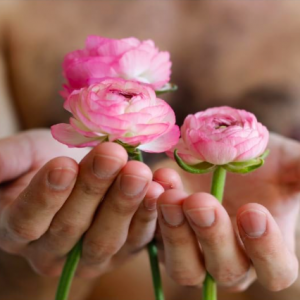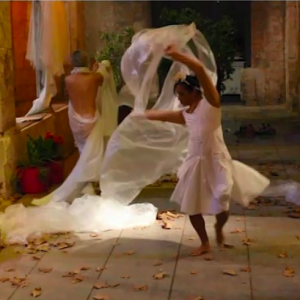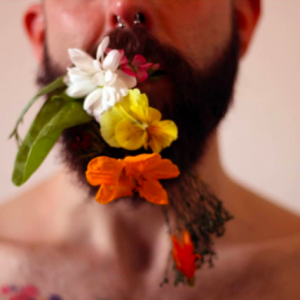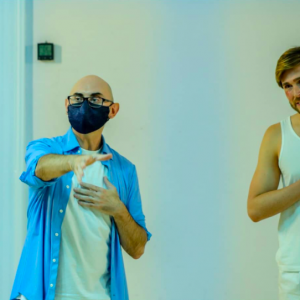We interviewed Edu Barbeira (Stambolsky) for Pressenza.com’s Gender and Sexualities in Latin America series in Spanish.
Continuing our series Gender and Sexualities in Latin America, we interviewed Edu Barbeira, an artist and activist we met in Barcelona a couple of years ago. Nine months ago, he moved to the city of Santander, capital of Cantabria, Spain, for it to make the Laboratorio de Ideas +, in an environment that is certainly different from the capital of Catalonia.
Q – Where does Stambolsky, your artistic and activist pseudonym, come from?
Stambolsky was born out of the social repression accumulated over the years and his name is nothing more than the surname of a married man, taken as a rebellion against a society in which he doesn’t fit in with what is established, as he doesn’t feel he is neither a man nor a woman and doesn’t understand certain traditions generated by society. He is a restless being who, from 2012 to 2022, worked with gender expression, giving visibility to non-normative notions and who, currently with the + community project, has created a laboratory of identities around the idea of the social café.
Q – How long did you live in Barcelona, and what were your experiences of art and activism there? I know that you had a close collaboration with the performer Keops Guerrero and that you collaborated in “Donde nacen las sirenas”, and that the bond has continued, as can be seen in the photographs on the website www.laboratoriodeideas.com.
The adventure in Barcelona not only lasted six years, but continues in the distance thanks to collaborations with artists and activists in the Catalan capital. Donde nacen las sirenas is a contemporary dance piece that combines video creation and experimental texts to talk about femininity in the western world. Thanks to the initiative of Mexican dancer and choreographer Keops Guerrero, together we created an emotive and informative visual work that has seen stages in countries such as Germany, England, France and Spain.
Q – Describe to us a little about what life is like in the city of Santander, and why you came there. How does it compare to Barcelona?
While Barcelona is a city that looks to the future, generating culture and diversity, Santander is on the opposite side. The capital of Cantabria shows greater resistance to new, dissident and alternative projects, leaving little room for diversity beyond the hegemonic. The Lab is a project that began in Barcelona to creatively investigate different masculinities and that initially took me to Edinburgh, the capital of Scotland where the typical regional male costume is a kilt.
In the end I decided to move to Brighton because it is close to London and has a better climate than Edinburgh, and there I realised that bodies and nature do not understand masculinities or femininities. That bodies themselves are part of a whole and it would be better to focus the project on non-normative bodies and identities such as transgender and queer identities. From there was born what is now a Laboratory of Identities, as a safe space to share and express gender, which due to the pandemic opened its doors in Santander, where my family lives.
Nine months after its opening, many potholes have been overcome and initiatives have been created to make visible the needs of a less binary and non-normative collective within a city attached to traditions and where neo-Nazi groups are unfortunately re-emerging with a preoccupying support.
Q – Almost 9 months after its opening, how do you evaluate the Identity Lab initiative?
The perfect gestation, nine months nurturing a project based on love, polyamory, a lot of culture and above all patience in a hostile global climate. Without institutional or private funding, + is a self-managed centre that has created a social café, an art club, currently has four sectors of activity and continues to create + options to make visible as many realities as there are people in the world. Thanks to the good teamwork and the transparency of its activities, the Laboratory has won a grant to participate in the European congress of ILGA, the international LGBT association, which will be held in October 2022 in Sofia, Bulgaria. At the same time, + has the support, while giving support, of different environmental groups such as Futuro Vegetal, La Bardal and Fridays for Future, raising awareness about the importance of taking care of the environment where we live.
Q – How is the Lab funded?
The Lab, as it is affectionately known, is a self-managed centre where the social café is the main source of income. Thanks to visitors’ consumption and the use made of it by creative groups such as Cristina Samaniego’s La Espiral Contemporánea, the space maintains its activity. Work is currently underway to create membership fees, giving free memberships to children under 16. At the same time, the Lab’s doors are open to collaborations and donations, partners and other forms of association for the future and with a look towards opening other Labs in different cities. We encourage you to visit the website www.laboratoriodeidentidades.com and become a member of this social adventure.
Q – I see that it is a multifunctional space open to the development of tools and a friendly environment for exchange, the enjoyment of sexuality and self-acceptance among diverse people in order to generate a dialogue with the rest of society that will lead to the necessary cultural transformations on the issues of gender and sexuality. Was there already a space similar to the Laboratory in Santander?
The need to open a social café in a city like Santander arose from the lack of community projects and the need to support a collective that does not feel identified with the hegemonic idea of LGBT acronyms. With concepts somewhat anchored in past decades on the part of institutions and collectives, generations + young people are looking for spaces to share where they do not have to explain or defend how they express their sexual desire or their identity, or both! From a care for the environment, the natural environment of human beings, the Laboratory is created around a vegan café and invites its users to make the space their own and share it as they feel it, thus generating a feeling of belonging within society. Nature does not discriminate, human beings do, that is why it is important to create a relationship with our body, nurture it and share it from our own reality.
Q – How is the relationship with feminisms, understanding that there is not just one feminism, but several, from the most extreme to the most open and dialoguing?
Right now, it is important to recognise the existence of other feminisms and the different realities and ways of being a woman, as ecofeminism, transfeminism and decolonial feminism show us. However, Santander focuses on a feminism that omits other social realities, such as women with penises, men with vaginas, racially diverse people, making them collectives that feminism in Santander does not recognise and does not include in its activism for a balanced society. The scarcity of young people makes the process of adapting to other feminist realities a slow work and from the Laboratory alternative discourses are made visible for a greater opening of consciousness towards the different realities that shape our society.
Q – Would you like to add some final words?
Anthony D. Williams said: “We are here to heal, not to hurt. We are here to love, not to hate. We are here to create, not to destroy”. From the Identity Lab, a respectful affection for the reality that each person creates is visible. Due to the constant addition of acronyms that are added to the LGBTQIA2+ collective to cover all possible identities, something called SOGIE was born and is already beginning to be used as an expression to give visibility to the group of people that make up our society from a non-binary point of view and far from the normativity that the acronyms entail. Sexual Orientation, Gender Identity and Expression (SOGIE) encompasses what Queer Theory was originally studying, a social equality where the unique expression of each person is valued in society as a whole. There are many people who do not identify with acronyms, because they continue to alienate, segregate and more recently profit economically, and only have the need to express their sexual desire and identity as they feel it. From +, Identity Lab, we create the space to express humanity, through art, wellbeing and the environment. Visit the website, Instagram, even the physical space in Santa Lucía 12 if you’re in Santander, and be part of the adventure, because the path is made together.
Other interviews in the series “Gender and Sexualities in Latin America”:
- Keops Guerrero, trans activist and artist (Barcelona, Spain).
- Franco Fuica, leader of OTD, trans rights organisation (Chile)
- Paulina Bravo, lesbian lawyer and activist for the rights of blind people (Chile)
- Marco Ruiz, historic leader of MOVILH and MUMS (Chile)
- Felipink, gay singer and performer (Chile)
- Diego Ramos, activist for the inclusion of persons with disabilities (Chile)
- Danilo Urbina, Transdisciplinary School of Sexuality (Chile)
*** If you know an activist from the Latin American world whose work deserves to be known, write to me at danmetor@gmail.com









